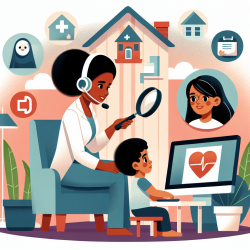As we navigate through the uncharted waters of our current global situation, the concept of 'normal' has been redefined, especially in the educational sector. The transition to online learning has not only impacted teachers and students but has also presented unique challenges and opportunities for specialized support services. Among these, telepractice jobs, particularly in the realm of online speech therapy, have emerged as vital components in ensuring that our educational system remains robust and inclusive. It is crucial for government health regulators to understand the significance of these roles and the need for supportive policies to facilitate their growth.
The abrupt shift to remote learning necessitated by health crises has spotlighted the importance of telepractice jobs. These roles, which allow professionals to provide therapeutic services over the internet, have become a lifeline for students who require speech therapy. The flexibility and accessibility of online speech therapy mean that no child needs to fall behind due to the inability to attend in-person sessions. This mode of delivery is not just a temporary fix but a sustainable model that can continue to support students in a post-pandemic world.
However, the transition to telepractice has not been without its challenges. For many, the feeling of being lost in the digital transition is palpable. Therapists who were accustomed to in-person interactions have had to adapt to new technologies and methods of engagement. Students, too, have had to adjust to receiving support in a different format. Despite these hurdles, the resilience and adaptability of both therapists and students have been remarkable. Success stories abound, demonstrating the effectiveness of online speech therapy in improving students' communication skills, thereby enhancing their overall learning experience.
Yet, for telepractice jobs to reach their full potential, they require the backing of informed and supportive government health regulations. Current regulations often lag behind technological advancements, creating barriers to the widespread adoption of telepractice. Licensing requirements, for instance, can be restrictive, limiting therapists' ability to provide services across state lines. This not only reduces the pool of available therapists but also restricts access for students in underserved areas. Furthermore, there is a need for clarity around reimbursement policies and data privacy standards specific to online therapy services.
Government health regulators have a critical role to play in addressing these challenges. By developing and implementing policies that support the growth of telepractice, regulators can ensure that all students, regardless of their geographical location or physical ability, have access to the support services they need. This includes revising licensing regulations to facilitate cross-state practice, ensuring equitable reimbursement for telepractice services, and establishing clear data protection standards to safeguard student privacy.
Moreover, promoting awareness and understanding of telepractice among educators, parents, and policymakers is essential. Misconceptions about the efficacy of online therapy need to be dispelled. Research and case studies highlighting the success of online speech therapy can help build confidence in telepractice as a viable and effective mode of service delivery. Additionally, providing resources and training for therapists transitioning to online platforms can help smooth the path for those feeling lost in the shift to digital.
As we look to the future, the importance of telepractice jobs in education cannot be overstated. The global shift towards digital platforms is not a temporary change but a long-term evolution. Online speech therapy and other telepractice services offer a flexible, accessible, and effective way to support students' learning and development. They represent a critical component of an inclusive educational system that can adapt to challenges and meet the needs of all students.
In conclusion, the transition to working from home and the adoption of telepractice in the educational sector have highlighted both challenges and opportunities. For government health regulators, the task at hand is clear: to create an environment in which telepractice can thrive. This means addressing regulatory barriers, ensuring equitable access, and promoting understanding and acceptance of online therapy services. By doing so, we can ensure that no student is left behind, regardless of the circumstances. The role of telepractice jobs, particularly in the realm of online speech therapy, is more important than ever. It's time for us to embrace this new normal and work together to support the continued growth and success of telepractice in education.










